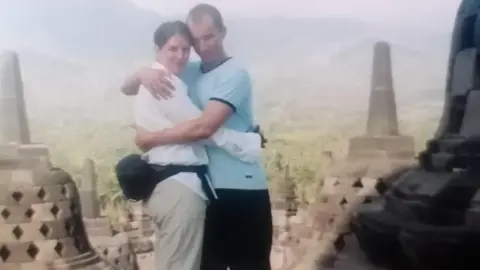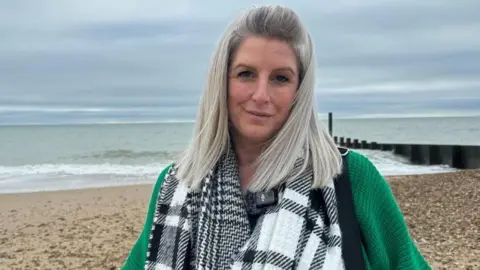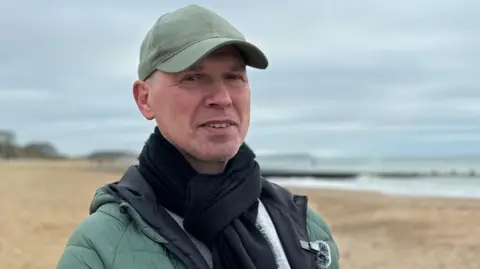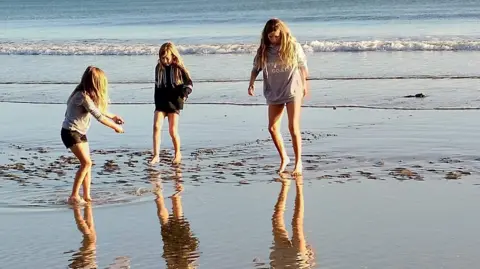'The tsunami wave came in and just took her'
 Family handout
Family handout"The wave came in and just took her, it just took her away."
On Boxing Day 2004, a 9.1 magnitude earthquake triggered a tsunami that raced towards shorelines around the Indian Ocean.
Twenty years later, Jason and Nicola have been reflecting on that fateful day and how they narrowly escaped with their lives.
The couple were in Sri Lanka on the last stop of their two-and-half-year backpacking trip around the world when the towering waves struck.
About 228,000 people were killed and coastal towns and villages ravaged, with entire communities swept away.
That morning they were snorkelling in the ocean off the palm-dotted beach in Hikkaduwa, in the southwest of the island.
"We were very aware of what we thought was plankton flowing through the sea," says Nicola.
"That's when we looked up and realised we weren't where we thought we were on the shore anymore and that we'd been dragged out.
"It wasn't the fact that it was plankton moving, it was the fact that we had moved."
Jason says he looked up at the glass-bottomed boats and sensed "a little bit of panic" on the surface of the water.
When he looked again, the boats "weren't there".
"I thought I must be seeing things but I wasn't, they just disappeared."

Nicola, 51, remembers the water suddenly changing: "When the first wave broke, that came over us. We kept getting dragged down.
"It would be a case of I'd go down, and I'd be panicking under water, I'd pop up and then Jay may not be there.
"Then he'd pop up and I remember seeing these massive eyes of fear staring back at me."
Jason, 56, adds: "We were just in a whirlpool of really strong currents that we couldn't get out of."
But the couple managed to make their way to some rocks.
"At that stage, the sea must have receded," says Nicola.
"We could see the seabed was exposed. You could see fish flapping around on the seabed."
They tried to climb down and wade back to the beach but a second wave struck.
"You're down at the bottom and you know that you're in the area that the water's going to come. And there's nothing you can do," says Jason.
"Like jet engines, you hear something coming, you hear the massive froth of water, and it's just coming towards you and it just comes over you."
Pushed towards the shore by the water, Jason managed to scramble to the top of another rock. Nicola was struggling to pull herself up.
"I just had Nicola by the hand," says Jason. "I was trying to pull her up.
"I couldn't hold her so she let go. I struggle with that… I thought it was all my fault, I couldn't hold her, I couldn't grip her.
"She was gone with the waves, it just took her away and I thought there's no way after what we've been through - however many hours it was - that she can survive that."
Nicola recalls that moment: "I knew if I said 'I love you' he would jump in and I didn't want him to."

Alone on the rock, Jason says: "I heard a voice in my head say 'run'. It was like a pathway just opened up and there was water either side. I got up, I ran to this guy and just fell in his arms."
In the water, Nicola was desperately trying to make her way to land.
"I tried to stay calm and swim in and I think a couple of times I did manage to get quite close to the shore, as close as 10m (33ft)," she says.
"I could hear people on the beach yelling at me 'run, run!' Another wave came, pushed me in and pulled me back out again."
"She heard people shouting - that was me," says Jason.
"Then you just heard that engine wave behind her again and you think 'no, no, no'. The wave came in and just took her, it just took her away."
Nicola recalls "chunks of wood, planks of wood, chairs" floating around and realising "I am the only one here".
Having spent hours in the water, Nicola drew on her diving training to survive, waving and calling for help.
"If I didn't know how to tread water, if I didn't know how to - this sounds mad - relax and float, I would be dead," she says.
Then she saw three surfers paddling out towards her on their surfboards.
"All I could see were these giant white teeth smiling at me, saying 'it's OK, you're going to be OK, we've got you'," she says.
"They towed me in and they kept saying 'you're going to be OK and if you're not OK, we all die together'.
"They didn't have to risk their lives for me, they didn't know me, they didn't have to come out and do that for me."
 Family handout
Family handoutTwenty years have passed since that terrible day and Nicola and Jason now have three daughters.
"For their sakes, we made ourselves go in the water," says Nicola.
"Slowly, over a passage of time, we're comfortable enough to be in the water.
"One of my worst fears is not being there when they're in the water.
"When we are on a beach with them, and I'm watching them, I know if it's looking dangerous, I can wave for them to come out.
"I can cope with it. But my biggest fear is when they all go off travelling on their own and I'm not there to wave. I know that will be an awful time as a parent."
The mum of three says it took them years to come to terms with what happened.
"How were we both alive when so many died?" she questioned.
"Why were we allowed to survive and others didn't? That took a while to process, the guilt of surviving.
"There was a long time, a good three or four years when I felt that I had cheated death.
"I thought it was going to come and get me in a different way - I'd be in a road crash, a tree would fall on me, another disaster would happen."
For Jason, he says it is part of who he is now: "It will live with us for the rest of our lives and I kind of like that.
"That fear that I had, that experience that I had, moulded me into the person that will hopefully make me stronger and my children will see that."
You can follow BBC Hampshire & Isle of Wight on Facebook, X (Twitter), or Instagram.
